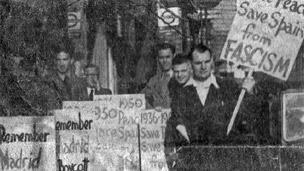Memorial unveiled for Swansea's Spanish Civil War veterans
- Published

Morgan Havard (far right) is one of the 11 veterans of the Spanish Civil War being honoured in Swansea
A memorial has been unveiled in Swansea to 11 men who left the city to fight fascism in the Spanish Civil War.
Three were killed and a number were injured, including Morgan Havard who lost an arm.
His family were among those who attended the unveiling of a plaque at the civic centre 75 years after the conflict began.
Mr Havard's daughter Julie Norton said: "I'm glad the people who fought in Spain are being recognised."
According to records held at the National Archives, about 4,000 people from Britain and Ireland travelled to Spain to join the fight against General Francisco Franco's forces between 1936 and 1939.
Swansea council has worked with the International Brigades Association to identify those men who came from Swansea.
Mr Havard, raised in a mining family in Craig Cefn Parc, was 23 when he volunteered.
Prisoner of war
He joined the International Brigade in October 1937 and was trained as a machine-gun instructor.
In April 1938 he lost an arm and was taken prisoner in the battle of Calacete.
Mrs Norton, who lives in Cwmllynfell, near Ammanford, said her father rarely spoke about the conflict.
"My mother talked about it more than him," she said.
"Both my parents were supports of the Communist Party of Great Britain and when I was a teenager there was a lot of anti-communism.
"I'm glad at last the people who fought in Spain are being recognised - I think people see the war slightly differently now."
After he returned to the UK Mr Havard settled in London after giving up his job as a welder because of the lose of his arm.
He ran several small businesses including a cafe and a shop and died aged 58.
"Supreme sacrifice"
"I don't think his experience, although horrific, affected him too badly mentally," added Mrs Norton.
"He did say that he could never face eating sweet corn or baked beans, as they were the staple diet at the prisoner of war camp."
Before the ceremony, she said she was looking forward to meeting other families of men from Swansea who were being honoured.
"The soldiers did not receive any sort of pension and were not recognised for what they had done," she added.
"I think [my father] would be pleased with the memorial and I don't suppose he would have imagined such a thing when he was alive."
The plaque was unveiled by the Lord Mayor of Swansea Ioan Richard.
"It's been three quarters of a century since men from our city marched off to support the elected government of Spain fight Franco's fascists," he said.
"And while there are other memorials to the Welsh fallen and the veterans of the war, this will be the first specially dedicated to those from the city of Swansea who were ready to make the supreme sacrifice for democracy."
- Published28 June 2011